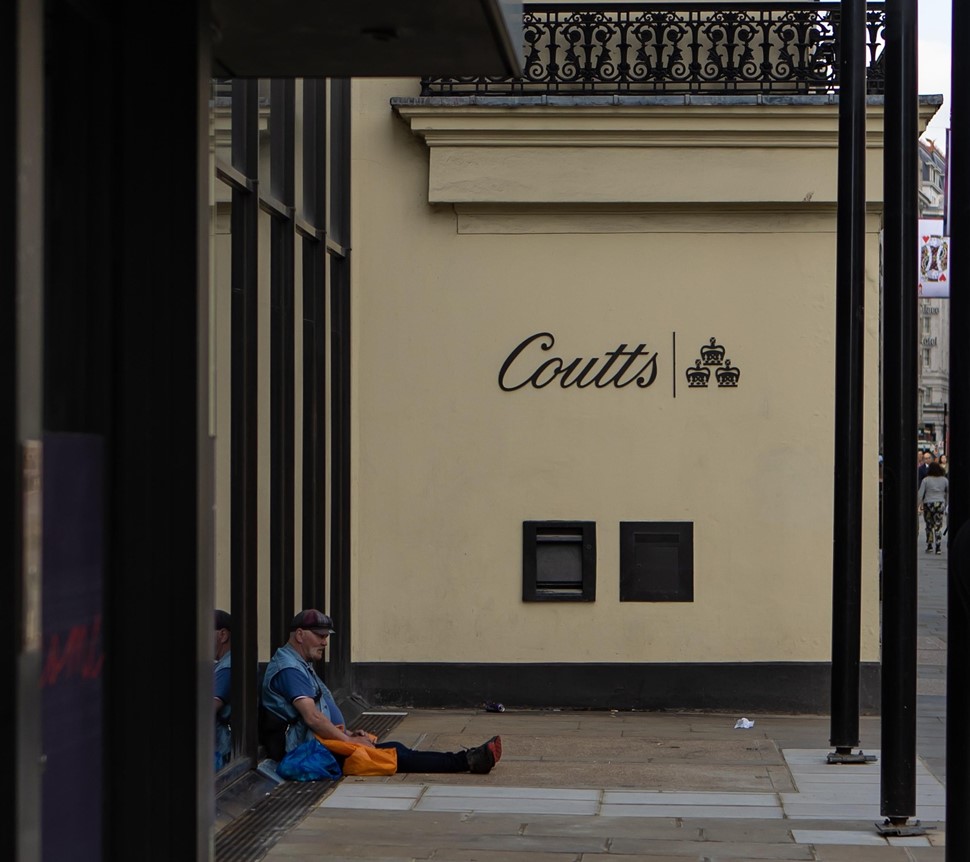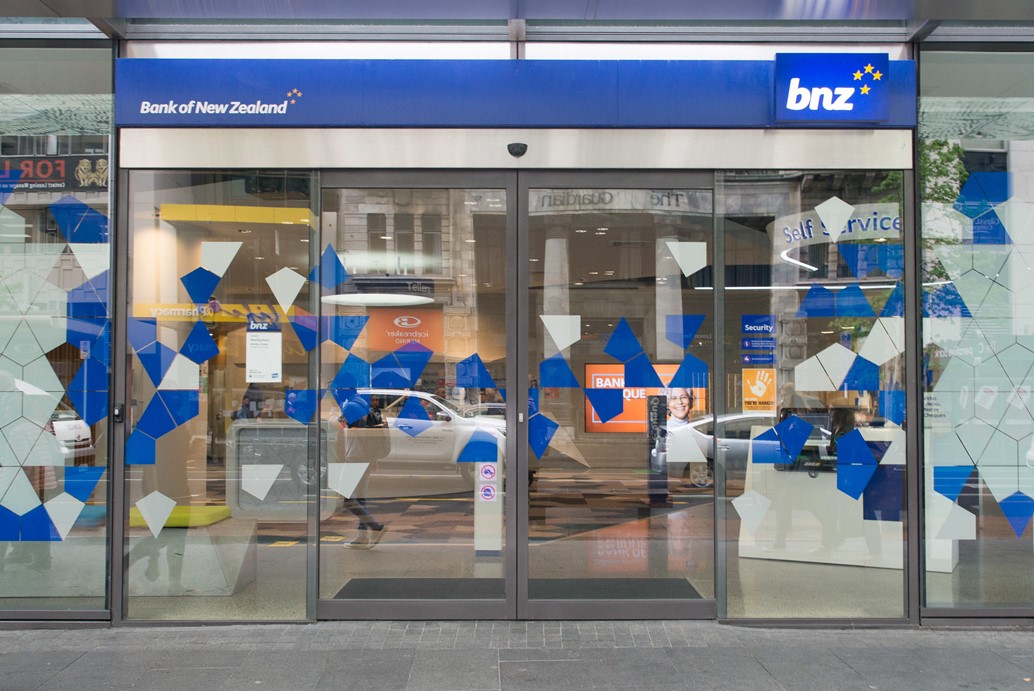When I was working offshore, each day, I would walk past the entrance of Coutts Private Bank in Jersey.
It was a reminder of the exclusive banking options some wealthy islanders enjoyed.
Coutts has been providing banking services since 1692. It is the bank of the British Royal Family.

Homeless man outside Coutts, London. Source: Image by Kev from Pixabay
In June 2023, Coutts Private Banking closed the account of Nigel Farage.
The reason? He failed to meet the eligibility criteria of ‘holding £1,000,000 or more in his account, following the expiry of his mortgage.’
He was instead offered a retail account with the bank’s owner, NatWest.
Farage smelt something fishy. He went to the press. It was discovered that Coutts had closed Farage’s account on some rather political grounds. He was, apparently, ‘at best seen as xenophobic and pandering to racists’.
When all came to light, NatWest CEO Dame Alison Rose resigned. Farage accepted an undisclosed settlement from the bank.

Nigel Farage at the 2018 Student Action Summit in Florida. Source: Gage Skidmore / Flickr
Banks and financial institutions can decline your business
Few people have the public profile of Nigel Farage. They don’t have the ability to put public pressure on huge banks.
Here in New Zealand, there have recently been a couple of cases of ‘debanking’.
Court decisions suggest that, yes, banks do generally have the right to terminate banking relationships.
The case of BNZ v Gloriavale saw the Court of Appeal overturn a High Court injunction.
- BNZ had provided banking services to Gloriavale for decades.
- In 2022, BNZ decided to terminate the relationship under its standard T&Cs — clause 8.2, which allowed termination ‘for any reason’ with 14 days’ notice.
- Apparently, this was guided by their internal human-rights policy. They found that children as young as 6 were employed at Gloriavale.
BNZ initially provided Gloriavale three months’ notice to find another bank.
Gloriavale obtained an injunction from the High Court.
BNZ was then successful in having this appealed. The Court held that there was no breach in contract under BNZ’s clause 8.2. They only needed to provide 14 days’ notice.
Further guidance suggested that the broader public issue of ensuring bank availability was one for Parliament to address — not BNZ’s responsibility.

BNZ branch, Queen Street, Auckland. BNZ is owned by National Australia Bank. Source: Victor Komarovsky / Flickr
No opening is more likely than debanking
The reality is that accounts with banks and other financial institutions are rarely closed.
More likely is people are refused new accounts. Or there is a lack of good financial account options. Accounts can be refused on AML, credit check, negative media, ‘risk-based’, or a range of other reasons.
Here in New Zealand, the size of our market and burdensome regulatory settings also means there is a lack of good banking and brokerage options.
The main banks are owned in Australia. When Gloriavale went up against BNZ, they were in fact dealing with the owner, National Australia Bank.
As for global brokerage, there are few really decent options available for New Zealand residents.
Government needs to look at settings on two levels:
1) Ensure every New Zealander can access a bank account. Either legislate to ensure banks must accept customers, or provide a fallback solution via state-owned KiwiBank.
2) Review regulatory settings that currently discourage international bank and brokerage houses from offering their services in New Zealand.
Thinking of closing accounts?
Generally speaking, if you have a good account with a financial institution, it can pay to keep that active. It’s far easier to keep an existing account these days than to try and obtain a new one.
On a few occasions, I have seen people come into inheritances overseas, only to wish they still had a bank or brokerage account in their old country.
Fortunately, more recent additions like Wise [LON:WISE] are helping to improve financial inclusion. Although Wise wallets don’t pay interest, they do provide a straightforward way to transact across the world.
Access to capital and opportunity
From time to time the market throws up great opportunity. This happens often in stock markets. More occasionally in property markets.
Having access to cash can allow you to buy quality assets at temporarily discounted prices.
The inevitability of inflation means that companies with real assets are sometimes valued at below the replacement cost of these assets. Many listed real estate businesses have been in this position. Some still are.
Banking and brokerage options with revolving lines of credit can be particularly valuable when these sorts of opportunities crop up.
Wealth is not money. Money tends to erode over time. Wealth is good assets.
So by definition, to grow your wealth, you need to put yourself in a position where you can buy great assets at sharp prices.
Farage was likely well aware of the benefits a Coutts Private Account gave him. He was not willing to let that go. And when he found that he’d been unfairly discriminated against, I don’t blame him for taking on the fight.
Regards,
Simon Angelo
Editor, Wealth Morning
(This article is the author’s personal opinion and commentary only. It is general in nature and should not be construed as any financial or investment advice. Please contact a licensed Financial Advice Provider to discuss your personal situation. Wealth Morning offers Managed Account Services for Wholesale or Eligible investors as defined in the Financial Markets Conduct Act 2013.)





Simon is the Chief Executive Officer and Publisher at Wealth Morning. He has been investing in the markets since he was 17. He recently spent a couple of years working in the hedge-fund industry in Europe. Before this, he owned an award-winning professional-services business and online-learning company in Auckland for 20 years. He has completed the Certificate in Discretionary Investment Management from the Personal Finance Society (UK), has written a bestselling book, and manages global share portfolios.